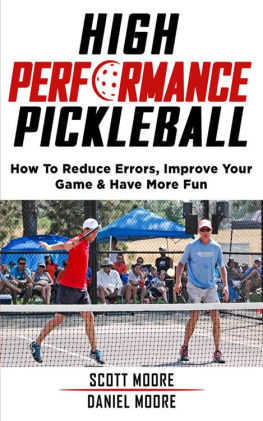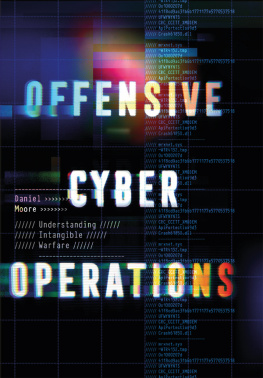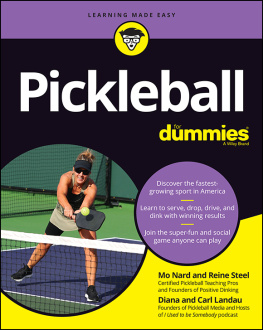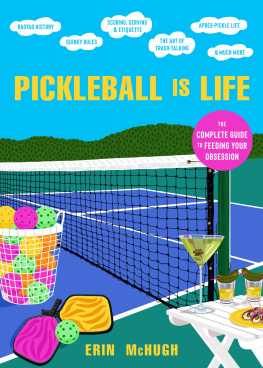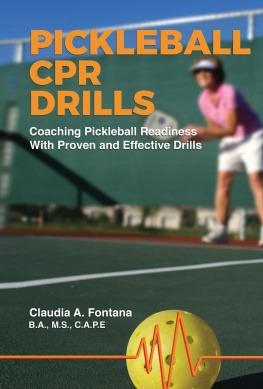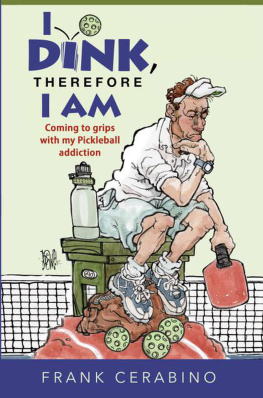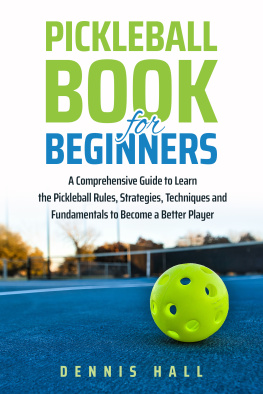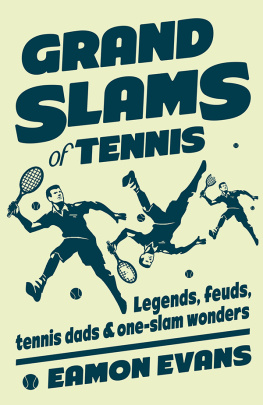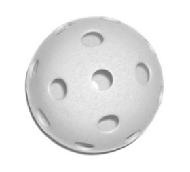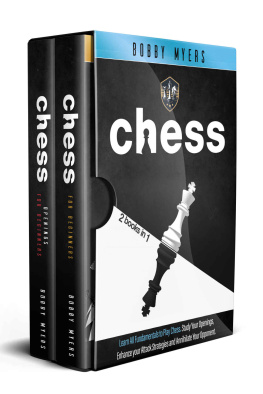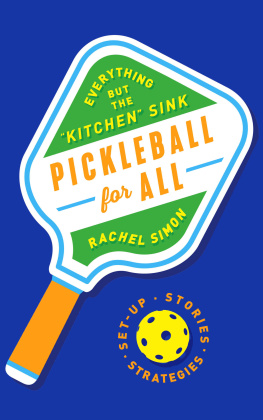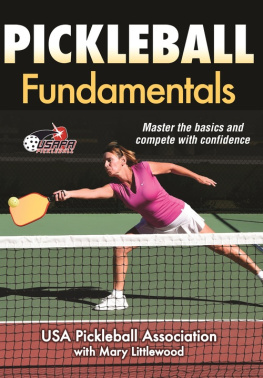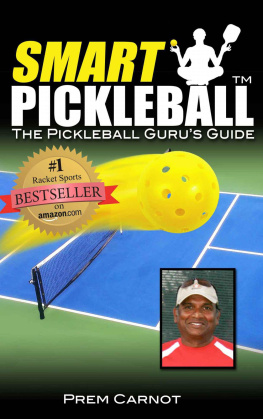All rights reserved. No part of this book may be reproduced, stored in a retrievalsystem or transmitted, in any form or by any meansother than for fair use as briefquotations, embodied in reviews and articleswithout the prior written consent ofthe publisher.
Disclaimer: The author makes no guarantees to the results youll achieve by readingthis book. Pickleball skills and strategy requires hard work and practice. Resultsmay vary according to age, skill level and physical ability.
Introduction
By Daniel
H ow to read this book: This book exists for two reasons. First is to teach you theskills and strategies that have become our proven framework for the best way to playthe game of pickleball. Second, we wrote this book so you will be inspired to enrollin our online training courses, or join us on one of our exotic pickleball tripsaround the world.
This book aims to provide deep insights that will help you improve your pickleballgame. The single most incredible thing about pickleball is how easy it is to pickup while being so strategic and layered that there is always something new to improve.It may seem like the pros immediately became 5.0 players and have nothing else tolearn but believe me, it was a struggle to reach the pro level. And it is a dailystruggle just to stay there. Improving means winning more games, of course, but moreimportantly, it is the journey and satisfaction of knowing that you are improving.Its hard work, and it takes time, but we want to help you reach all of your pickleballgoals, whatever they may be.
So what makes this book different? There are tons of YouTube videos and free HowTo manuals out there. Why pay good money for something like this? First, you getwhat you pay for. We have taken hundreds of hours to write this book and tens ofthousands more on the court to think about the most relevant and strategic contentwe want to provide you. We will go deeper into each shots theory, strategy, mentalside, and execution than anyone else ever has. We have struggled, practiced, andthought through these concepts daily and know they will be helpful to you on yourown path.
Second, participants often tell us they loved the coaching at clinics or camps, butit was like drinking through a fire hydrant. They cant possibly retain all the informationand dont have time to write anything down. When teaching in person, we tell peopleto take home just one or two concepts from a lesson and practice them until theybecome part of their game. We have done our jobs if they can improve in one or twopractical ways from a class or clinic.
However, the advantage of a book is the ability to return to it numerous times. Somethingmight not stick out the first time, but it inspires you at another point down theroad. Or maybe when struggling with a particular shot and nothing else seems to work,you return to the book for guidance, and something clicks. Every coach explains thingsdifferently, so it is always good to have multiple perspectives. Hopefully, somethingabout how we describe a particular concept resonates with you.
Allow us to insert a caveat here: This book is written for everyone but explainssome higher-level pickleball insights. While many concepts remain constant from beginnerto elite level, other insights may contradict some beginner or intermediate levelteaching. We dont want to confuse you, but as you have likely seen, the pros dontalways follow the same rules that beginner-level players do. We want to break downthe strategies and concepts to help you reach the highest level possible. This isdefinitely not an introduction to pickleball, so if you are looking for basic rules,ideas, or strategies, there are plenty of other books for that.
Of course, the problem with a book is that we cannot show you the concepts we explain.In our online training programs, we actually demonstrate each of the skills and strategiesoutlined in this book, along with some drills we use to master the techniques. Ifyou are a visual learner, our online pickleball course is a great companion to thisbook. Sign up at HighPerformancePickleballAcademy.com.
For us, pickleball has been life-changing in so many ways. From the relationshipsmade, businesses created, better fitness, and rediscovering the fun of competingand constantly improving, it has been an incredible ride that continues today. Whetheryour goal is having fun, losing some weight, moving up a level, playing a tournament,or becoming a professional pickleball player, go for it. We are there to cheer youon.
Chapter 1
Life Before Pickleball
By Scott
O ur pickleball journey began sometime in 2012 when a good friend innocently invitedme to play this crazy-sounding game called pickleball. Of course, being a racketsports junkie, I had to try it. Little did I know it would so profoundly impact thecourse of my life. I am sure many of you can relate. It is amazing how one momentor encounter can change your life so much, and John Foss will probably never knowhow thankful I am for his innocent invitation back in 2012.
I would also be remiss to exclude my parents, who contributed significantly to myjourney long before I even encountered pickleball. At 6 years old, they bought mea ping-pong table for Christmas and, by extension, a lifetime of skills, friends,family, and competition. Unfortunately, all too often, those paddles were used onmy backside, but it was always deserved. I have been fortunate to share many of thosesame lessons and moments with my own kids and even my first grandchild, Holland.
Just as impactful, my mother took me to our country club for tennis lessons aroundthe same time. I loved it and played through my junior years, being ranked in Texasand finishing third at state my senior year after an undefeated season (until thattournament anyway). Entering the University of Texas, I tried walking onto the team,but lost a heartbreaker for the last spot that effectively ended my tennis career.I was never happy without a racket in my hand, so I picked up racketball, which laterconnected me to Japan. I like to think things worked out how they were supposed to.Decades later, I met the guy who knocked me out of college tennis, when he coachedagainst my sons high school tennis team. Andy plays pickleball now, and we havedone clinics for his club in Denver. It is so interesting how things come full circleand what a small world we live in, especially in the world of pickleball.
Many people dont know about the 16 years our family spent in Japan. Inevitably theyask, why Japan? Honestly, I cant say for sure. It was either an answered prayer,a mistake by the Japanese government, or just perfect timing. I had visited Japanonce during college and became fascinated with the culture. Until then, I believedAmerica was superior, but my experience in Japan shattered my worldview. I learnedthat different doesnt mean worse, another lesson that forever impacted my life.That summer, I made lifelong friends who showed me around Tokyo while practicingtheir English and demonstrating a level of hospitality I had never experienced before.All I can say is those friendships and memories drew me back.
Fast forward seven years when Susan and I had graduated from the University of Texas,married, and were living in Atlanta where I worked for a commercial real estate developer.My boss suggested joining the Japan America Society, as the Japanese were buyingup and financing vast amounts of commercial real estate in the late 80s. When I discoveredthe Japanese government offered scholarships to international students for graduateschool, I decided to apply. We always wanted to live abroad for a stint and becomefluent in a second language. I was miraculously selected and received an all-expense-paidscholarship, along with a generous monthly stipend to fund a couple of years of languageand graduate school, an offer too good to refuse. I ended up with a masters degreein economics focused on Japanese business and became quite fluent in the process.

